- Home
- Tim Lebbon
Naming of Parts Page 4
Naming of Parts Read online
Page 4
One of the women had fresh blood splattered across the front of her night-gown.
The child was chewing something bloody. Flies buzzed his head, but none seemed to be landing.
Perhaps, Jack thought, the flies were dead as well.
The people did not pause. They walked straight at Jack and his parents, arms swinging by their sides from simple motion, not habit.
“I doubt they can run that fast,” Jack’s dad said.
“I’m scared,” his mother whispered.
“But can they get through the hedge, Dad? Once we’re through, will they follow us?”
Jack looked from the people to the hedge, and back again. He knew what was wrong with them—they were dead and they craved live food, his parents had learned all that from the news yesterday—but still he did not want to believe.
Their nostrils did not flare, their mouths hung open but did not drool, their feet plodded insistently…but not aimlessly. These dead things had a purpose, it seemed, and that purpose would be in their eyes, were they moist enough to throw back reflections.
“They’re looking at us,” Jack said quietly.
They walked slowly, coming on like wind-up toys with broken innards; no life in their movements at all.
Seconds later, they charged.
Whatever preconceptions Jack had about the ability of dead things to move were slaughtered here and now. The dead folk did not run, they rampaged, churning up the earth with heavy footfalls, shattering the strange peace with the suddenness of their movement. Yet their faces barely changed, other than the slack movement of their jaws snapping shut each time their feet struck mud. They did not shout or pant because, Jack guessed, they had no breath.
His dad fired the shotgun and then they all ran towards the hedge. Jack did not see what effect the shot had, he did not want to. He could sense the distance rapidly closing between them. The hedge seemed a hundred steps away, a thousands miles, and then he saw his father slowly dropping behind.
“Dad, come one!”
“Run Jackie!”
“Dad!” He was fumbling with the shotgun, Jack saw, plucking out the spent cartridges and trying to load fresh ones. “Dad, don’t bother, just run!”
“Gray, Gray,” he heard his mother panting under her breath, but she did not turn around. She reached the hedge first and launched herself at what she thought was an easy gap to squeeze through. She squealed, and then screamed, when she became impaled on barbed wire and sharp sticks.
Jack was seconds from the hedge but his dad was now out of sight, behind him and to the left. Jack was watching his feet so he did not trip, but in his mind’s eye he saw something else: his father caught, then trampled, then gnawed into, eaten alive while he lay there broken-backed and defenceless …
He reached the hedge but did not slow down. Instead he jumped, scrabbling with his hands and feet even before he struck the tangled growth, hauling himself up and through the sharp thorns, the biting branches, the crisp spring foliage. Bloody tears sprang from cuts on his hands and arms.
“Mum!” he shouted as he tumbled over the other side. The breath was knocked from him as he landed, and he crawled back to the hedge in a kind of silent, airless void.
As he found his breath, he heard the blast of the shotgun once more. Something hit the ground.
His mum was struggling in the heart of the hedge and Jack went to her aid. She was already cut and bleeding, the splashes of blood vivid against withered leaves and rotting buds. “Stop struggling!” he shouted.
The shotgun again.
“Dad!”
He could see glimpses of frantic movement through the hedge—
And then he knew it was going to be all right. Not for ever—in the long term everything was dark and lonely and different—but for now they would all pull through. He saw his bloodied parents hugging each other, felt the coolness of blood on his neck, smelled the scent of death receding as they left the mindless dead behind to feed on other things. He also saw a place where everything would be fine, but he had no idea how to get there.
“Jack, help me!” his mother shouted, and everything rushed back. He reached out and grabbed her arms, and although she screamed, still he pulled.
The hedge moved and shuddered as bodies crashed into it on the other side. He could not see his dad but he did not worry, there was nothing to worry about
(yet, nothing to worry about yet)
and then he came scrambling over, throwing the shotgun to the ground and following close behind.
His mother came free with a final harsh scream. Jack saw the wounds on her arms and shoulders where the barbed wire had slashed in and torn out, and he began to cry.
“Oh Janey,” his dad said, hugging his wife and letting his tears dilute her blood. Jack closed his eyes because his mum was bleeding…she was hurt and she was bleeding…But then she was hugging him and her blood cooled on his skin.
“Come on, I don’t want to stay here a minute longer,” his father said. “And maybe they’ll find a way through. Maybe.”
They hurried along the perimeter of the new field, keeping a wary look out in case this place, too, had occupants ready to chase them into the ground.
Jack looked back only once. Shapes were silhouetted on and in the hedge like grotesque fruits, their arms twitching uselessly, clothes and skin stretched and torn on barbed wire and dead wood
He did not look again, but he heard their struggles for a long while. By the time he and his family reached the gate that led out into a little country lane, their stench had been carried away on the breeze.
The lane looked unused, but at least it was a sign of humanity.
Jack was so glad to see it.
They turned east. Jack wondered at his conviction that there was something dangerous approaching, moments before the crowd had rounded the corner in the field. He had smelled them, of course, that was it. Or perhaps he had heard them, he had a good sense of hearing, his mother always said so.
Or perhaps he had simply known that they were there.
His mother and father were walking close together behind him, almost rubbing shoulders. Almost, but not quite, because his mum’s arm was a mess, there was blood dripping from her fingertips as they walked, and Jack had seen her shoulder where a flap of skin hung down across her armpit, and he’d seen the meat of her there where the barbed wire had torn her open.
It didn’t hurt, she said, it was numb but it didn’t hurt. Jack knew from the way she talked it that the numbness would not last. Once the shock had worn off and the adrenaline drained from her system, the slow fire would ignite and the pain would come in surges. For his mother, the future was a terrifying place promising nothing but worse to come.
Total silence surrounded them. The landscape had taken on an eerie appearance, one normally reserved for the strangest of autumn evenings, when the sun was sinking behind wispy clouds and the moon had already revealed itself. The hills in the distance were smothered in mist, only occasional smudges of green showing through like old bruises. Nearer by, clumps of trees sprouted on ancient hillocks. The trees were all old, Jack knew, otherwise the farmers would have cut them down; but today they looked positively ancient. Today they looked fossilised, petrified like the wood his friend Jamie had brought back from his holiday in the Dominican Republic the year before, wood so old it was like stone.
What would those trees feel like now, Jack wondered? Would their trunks be cold and dry as rock, or was there still that electric dampness of something alive? Were their leaves as green and fresh and vibrant as they should be in the spring…or were they as dead inside as the young harvest across the fields?
If I cut them, Jack thought, will they bleed?
“Hang on,” his mum said, and he knew that the pain had begun. He turned back and saw her sink slowly to her knees in the lane, his dad standing over her, one hand reaching out but not touching her shoulder because he did not know what to do. It was always Jack’s mum who did the comforting, the
molly-coddling when Dad had a cold, the reassuring when Jack woke from nightmares and became frustrated when he just could not explain exactly what they were about. And now that she needed comforting, his dad was standing there like he was balancing a teacup on the back of his hand, unable to help his wife where she knelt bleeding and crying into the muck.
“Mum,” Jack said, “my teacher said that pain is transitory.”
“Big words, Jackie,” she said, trying to smile for him.
“It’s what he said, though. He was telling us because Jamie was going to the dentist for a filling, and he was scared of the needle. Mr Travis said pain is transitory, you feel it when it happens but afterwards you can’t remember exactly what it was like. You can’t recreate pain in your memories because your body won’t let you, otherwise it’ll only hurt again.”
His dad handed her a handkerchief and she lifted her sleeve slowly, revealing some of the smaller cuts and dabbing at them as if that would take her attention from the gaping wound in her shoulder. “The point being?” she said, sharply but not unkindly. Jack could see that she was grateful for the distraction.
“Well, if you’re hurting just cast your mind into the future. When you’re all better, you won’t even remember what the hurting was like. And pain doesn’t actually hurt you, anyway. It’s only in your head. Your cuts will heal, Mum. In a few days it won’t matter.”
“In a few days …” she said, smiling and sighing and opening her mouth as if to finish the sentence. But she left it at that.
“It’s almost midday,” his dad said.
“I should be in school.”
“School’s off, kiddo!” Tears were cascading past his mum’s smiling mouth.
“We should get moving, if we can. Janey, you think you can move, honey? If we’re going to get to Tewton—”
“Where are we now?” Jack’s mum asked suddenly.
His dad frowned but did not answer.
“Gray? Don’t tell me that. Don’t say we’re lost.”
“Well,” he said, “Tall Stennington is maybe three miles back thataway.” He turned and pointed the way they had come, though Jack thought he was probably off by about a sixth of a circle anyway. “So we must be nearing the river by now. You think, Jackie?”
You think, Jackie? His dad, asking him for advice in something so important. He tried to see himself from his father’s eyes. Short, skinny, into books instead of his dad’s beloved football, intelligent in his own right but academically average…a kid. Just a kid. However much Jack thought about things, used big words, had a hard-on when he watched bikini-clad women on holiday programmes…he was just a kid to his dad.
“No,” Jack said. “I think you’re a bit out there, Dad. I reckon we’re closer to Peter’s Acre than anything, so we really need to head more that way, if we can.” He pointed off across the fields to where the landscape rose in the distance, lifting towards a heavily wooded hillside. “Tewton is over that hill, through the woods. If you drive you go that way, yes,” he said, indicating the direction his father had suggested. “But if I was a crow, I’d go there.”
“So by the time we get that far,” his mum said, “what I’m feeling now I’d have forgotten.”
Jack nodded, but he was frowning.
“OK, Jackie. Let’s hit it.” And up she stood, careful not to look down at the strip of her husband’s T-shirt wrapped around her shoulder, already stained a deep, wet red.
They left the lane and moved off across the fields towards the tree-covered hillside in the distance. Between them and the woods lay several fields, a veiny network of hedges, hints of other lanes snaking from here to there and a farmstead. It looked quiet and deserted; no smoke rose from its chimneys; its yard seemed, from this distance, empty and still. Yet for the first time, Jack was glad that his dad was carrying the gun.
Something had changed, Jack thought, since before their flight from the dead people and his mother being tangled and wounded in the hedge. It was her attitude to things—the nervousness had been swept aside by the pain, so that now she seemed to accept things more as they came than as she expected them to be. But this change in his mother had also moved down the line to his father and himself, altering the subtle hierarchy of the family, shifting emphases around so that none of them were quite the people they had been that morning.
Jack suddenly wanted to see Mandy. In the four years since her leaving home she had become something of a stranger. They still saw her on occasion—though it was always she who came to visit them—but she changed so much every time that Jack would see a different person walking in the door. She and Jack were still very close and there was an easy atmosphere between them that his parents seemed to resent, but she was not the Mandy he remembered.
Sometimes Jack would imagine that his sister was still living at home. He would go into her bedroom, and although it had been cleared out by his parents and left sterile and bland—forever awaiting a visitor to abuse its neatness—he could sense her and hear her and smell her. Only his memories placed her there, of course, but he would sit and chat with her for hours.
Sometimes, when he next spoke to her on the phone, they would carry on their conversation.
“When can we go to see Mandy?” he asked, realising as he spoke that he sounded like a whiner. They were going, that was that, and they certainly could not move any faster.
“We’ll be there by tonight, Jackie,” his mother said comfortingly.
“You do love her, don’t you?” he asked.
“Of course we do! She’s our daughter—your sister—so of course we love her!”
“So why don’t we go to see her any more?”
His mother was silent for a while, his father offering no help. There was only the crunch of their feet crushing new grass into crisp green fragments in the dirt. It sounded to Jack as though they were walking on thin ice.
“Sometimes people fall out,” his mother said. “There was that time she made you run away—”
“She didn’t make me, I told you, I did it myself!”
His mother winced in pain as she turned to him and Jack felt ashamed, ashamed that he was putting her through this soon after she had been dragged through a wire fence and torn to shreds. But then, he thought, maybe there was no better time. Her defences were down, the pain was filtering her thoughts and letting only essential ones through, holding back the ballast and, maybe, discarding it altogether.
“Mandy scared you,” she said. “She was doing something she shouldn’t have been doing and she scared you and you ran away. We didn’t find you until the next day, and you don’t …” She looked up at the sky, but Jack could still see the tears. “You don’t know what that night did to your Dad and me.”
“But you still love her?”
His mother nodded. “Of course we do.”
Jack thought about this for a while, wondering whether easy talk and being together were really the most important things there were. “That’s okay then,” he said finally. “I’m hungry.”
Mum dying, because she’s hurt, he thought, naming his fears automatically. Things changing, it’s all still changing. Dead people. I’m afraid of the dead people.
“We’ll eat when we get to Tewton,” his dad said from up ahead.
“And I’m thirsty.” No food, no drink…no people at all. Death; we could die out here.
“When we get to Tewton, Jackie,” his dad said, more forcefully than before. He turned around and Jack could see how much he had changed, even over the last hour. The extraordinary had been presented to him, thrust in his face in the form of a gang of dead people, denying disbelief. Unimaginable, impossible, true.
“I expect those people just wanted help, Dad.” He knew it was crazy even as he said it—he knew they’d wanted more than that; he had seen the fresh blood—but maybe the idea would drain some of the strain from his dad’s face. And maybe a lie could hide the truth, and help hold back his mother’s pain, and bring Mandy back to them where she belonged,
and perhaps they were only on a quiet walk in the country…
“Come on, son,” his father said, and Jack did not know whether he meant move along, or give me a break. Whatever, he hated the air of defeat in his voice.
My dad, failing, he thought. Pulling away from things already, falling down into himself. What about Mum? What about me?
Who’s going to protect us?
They had crossed one field and were nearing the edge of another when Jack suddenly recognised with their surroundings. To the left stood an old barn, doors rotted away and ivy making its home between the stones. The ivy was dead now, but still it clotted the building’s openings, as if holding something precious inside. To the right, at the far corner of the field, an old metal plough rusted down into the ground. He remembered playing war here, diving behind the plough while Jamie threw mud grenades his way, ack-ack-acking a stream of machinegun fire across the field, crawling through the rape crop and ploughing their own paths towards and away from each other. Good times, and lost times, never to be revisited; he felt that now more than ever. Lost times.
“I know this place!” he said. “There’s a pond over there behind that hedge, with an island in the middle and everything!” He ran to the edge of the field, aiming for the gate where it stood half-open.
“Jack, wait!” his dad shouted, but Jack was away, cool breeze ruffling his hair and lifting some of the nervous sweat from his skin. The crinkle of shoots beneath his feet suddenly seemed louder and Jack wanted nothing more than to get out onto the road, leave these dead things behind, find a car or thumb a lift into Tewton where there would be help, where there had to be help, because if there wasn’t then where the hell would there be help?
Nowhere. There’s no help anywhere. The thought chilled him but he knew it was true, just as he had known that there were dead people around the corner of the field—
—just as he knew that there was something very, very wrong here as well. He could smell it already, a rich, warm tang to the air instead of the musty smell of death they had been living with all morning. A fresh smell. But he kept on running because he could not do anything else, even though he knew he should stay in the field, knew he had to stay in the field for his own good. He had played here with Jamie, they had shared good times here so it must be a good place.

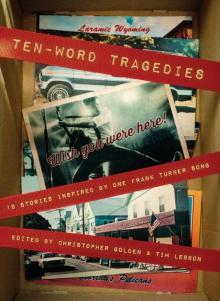 Ten-Word Tragedies
Ten-Word Tragedies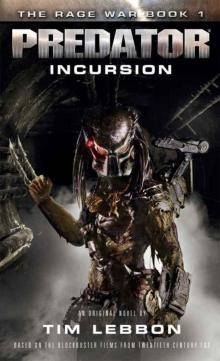 Predator: Incursion
Predator: Incursion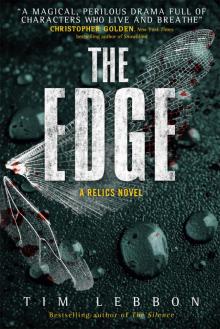 Relics--The Edge
Relics--The Edge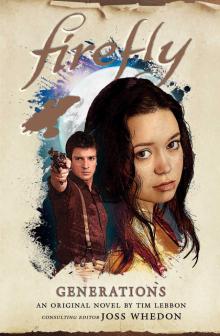 Firefly
Firefly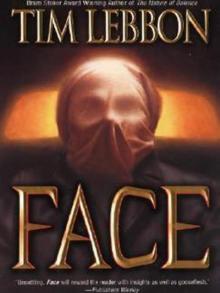 Face
Face Generations
Generations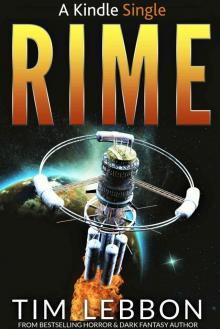 RIME (Kindle Single)
RIME (Kindle Single) Fallen
Fallen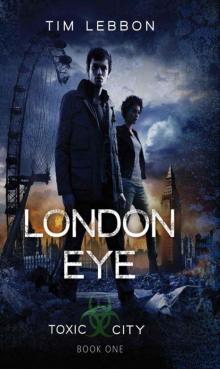 London Eye tc-1
London Eye tc-1 Kong: Skull Island
Kong: Skull Island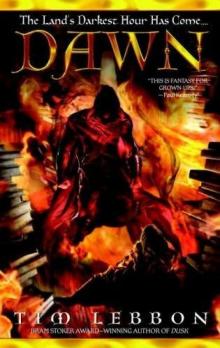 Dawn n-2
Dawn n-2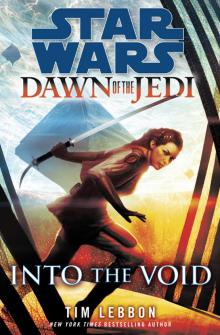 Into the Void: Star Wars (Dawn of the Jedi)
Into the Void: Star Wars (Dawn of the Jedi)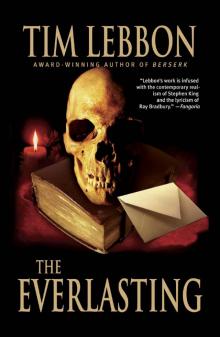 The Everlasting
The Everlasting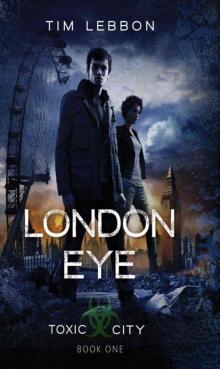 London Eye: 1 (Toxic City)
London Eye: 1 (Toxic City)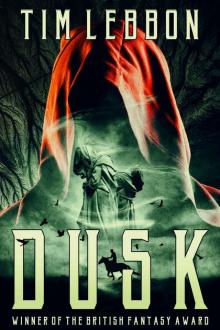 Dusk: a dark fantasy novel (A Noreela novel)
Dusk: a dark fantasy novel (A Noreela novel)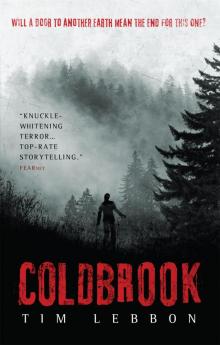 Coldbrook
Coldbrook Alien
Alien Dusk
Dusk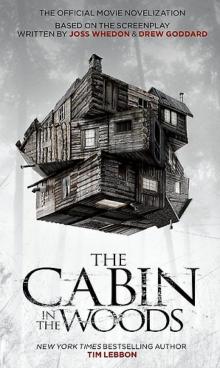 The Cabin in the Woods
The Cabin in the Woods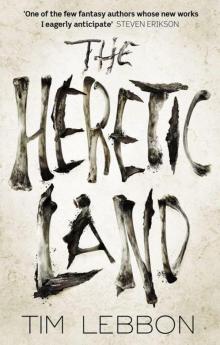 The Heretic Land
The Heretic Land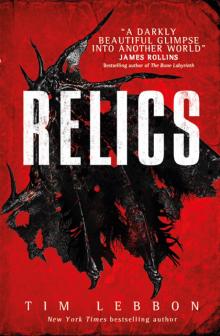 Relics
Relics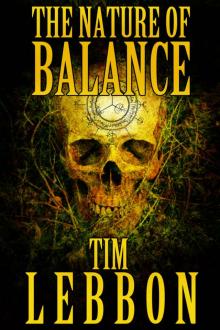 The Nature of Balance
The Nature of Balance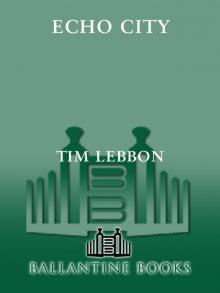 Echo City
Echo City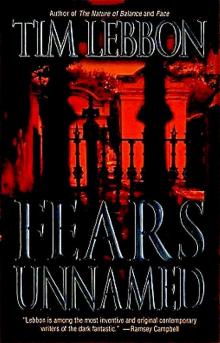 Tim Lebbon - Fears Unnamed
Tim Lebbon - Fears Unnamed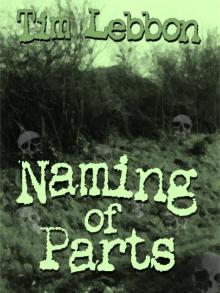 Naming of Parts
Naming of Parts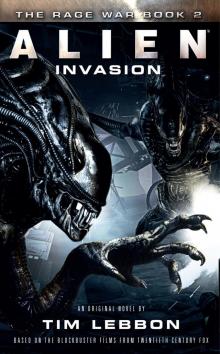 Alien--Invasion
Alien--Invasion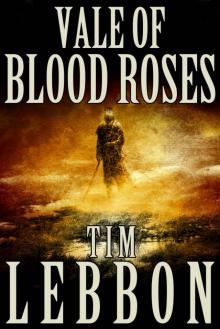 Vale of Blood Roses
Vale of Blood Roses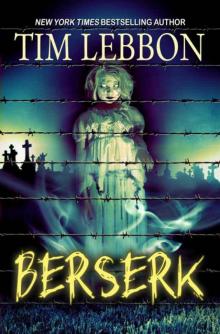 Berserk
Berserk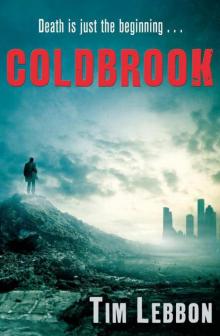 Coldbrook (Hammer)
Coldbrook (Hammer)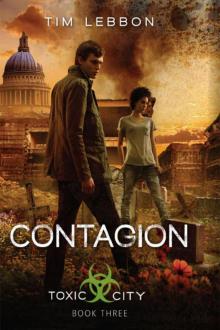 Contagion tc-3
Contagion tc-3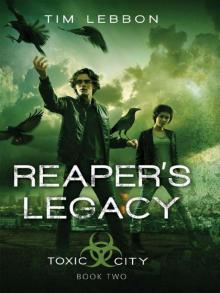 Reaper's Legacy: Book Two (Toxic City)
Reaper's Legacy: Book Two (Toxic City)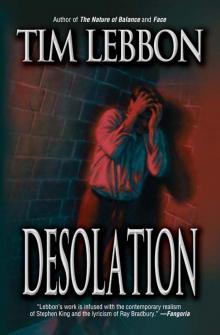 Desolation
Desolation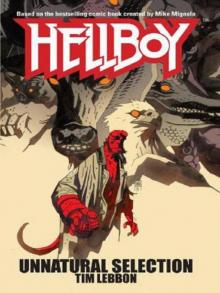 Unnatural Selection
Unnatural Selection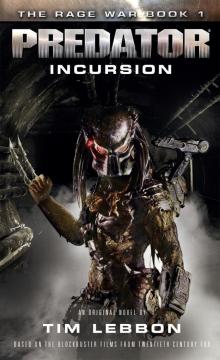 Predator - Incursion
Predator - Incursion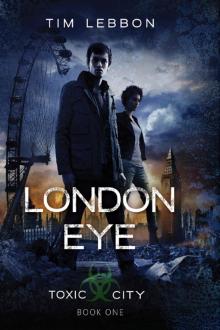 London Eye
London Eye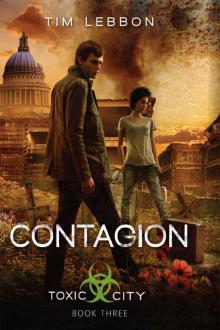 Contagion (Toxic City Book Three)
Contagion (Toxic City Book Three) The Silence
The Silence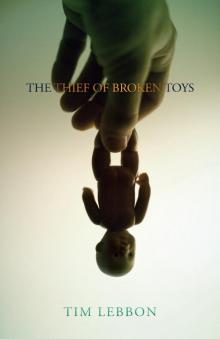 The Thief of Broken Toys
The Thief of Broken Toys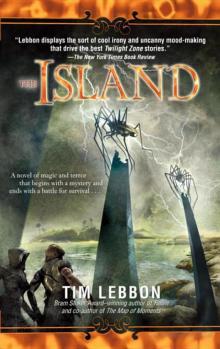 Tales of Noreela 04: The Island
Tales of Noreela 04: The Island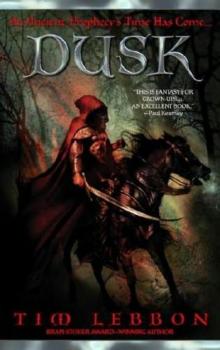 Dusk n-1
Dusk n-1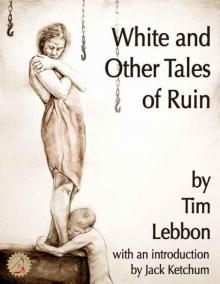 White and Other Tales of Ruin
White and Other Tales of Ruin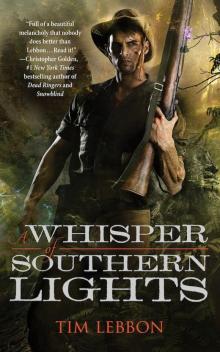 A Whisper of Southern Lights
A Whisper of Southern Lights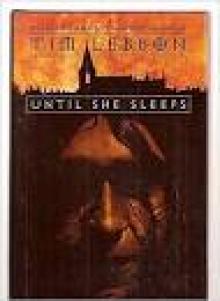 Until She Sleeps
Until She Sleeps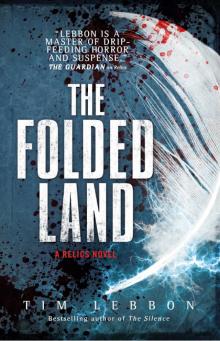 Relics--The Folded Land
Relics--The Folded Land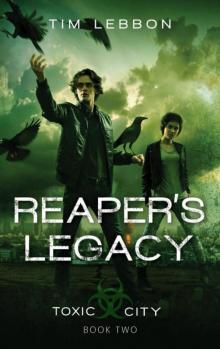 Reaper's Legacy tc-2
Reaper's Legacy tc-2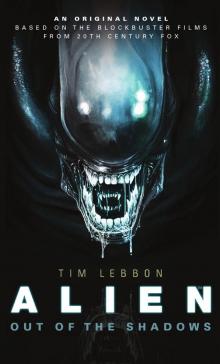 Alien: Out of the Shadows
Alien: Out of the Shadows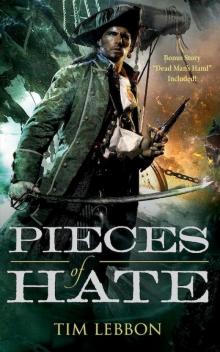 Pieces of Hate
Pieces of Hate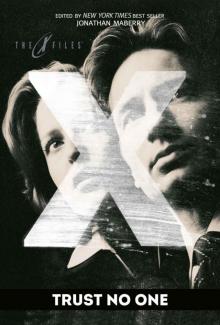 X-Files: Trust No One
X-Files: Trust No One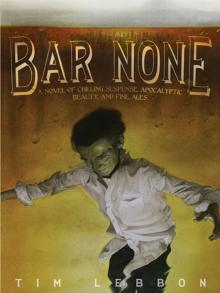 Bar None
Bar None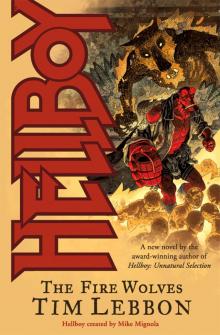 The Fire Wolves
The Fire Wolves